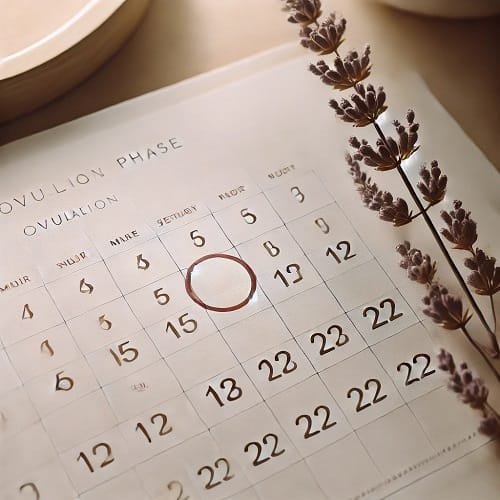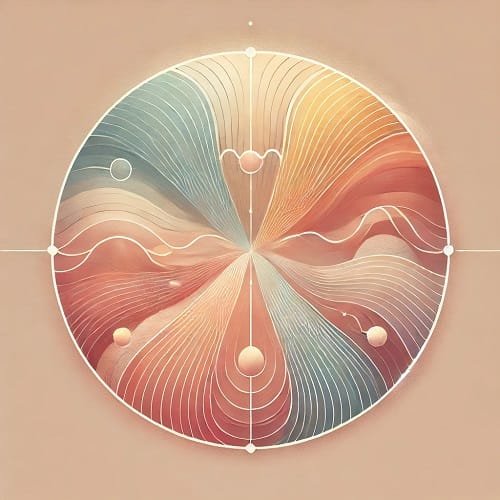1. Introduction
Anxiety during ovulation is a common yet often misunderstood experience for many women. It’s not just about emotional ups and downs or feeling more irritable—this type of anxiety is linked to the hormonal changes that occur during the menstrual cycle. Although anxiety during ovulation isn’t talked about as frequently as other menstrual symptoms, it affects many individuals and can have a significant impact on emotional well-being.
Understanding why anxiety during ovulation happens is essential in managing it. As your body prepares to release an egg, hormone levels, particularly estrogen and progesterone, fluctuate, which can trigger a cascade of physical and emotional symptoms. These can include everything from irritability and mood swings to more intense feelings of nervousness and anxiety.
If you find yourself feeling anxious during certain times of the month, you’re not alone. The hormonal changes that come with ovulation can lead to increased anxiety, stress hormones, and even PMS-like symptoms. In this blog, we’ll explore why this happens and offer practical advice on how to manage anxiety during ovulation, helping you feel more in control of your emotions and overall well-being.
Table of Contents
- 1. Introduction
- 2. Understanding Ovulation and Its Effect on Emotions
- 3. Why Anxiety During Ovulation Happens
- 4. Symptoms of Anxiety During Ovulation
- 5. How to Manage Anxiety During Ovulation
- 7. When to Seek Professional Help
- 8. Conclusion and Takeaways
- 9. FAQs
2. Understanding Ovulation and Its Effect on Emotions

To understand why anxiety during ovulation occurs, it’s essential to first understand what happens in your body during this phase. Ovulation is a natural part of the menstrual cycle, typically occurring around the middle of the cycle, approximately 14 days before the start of your next period. During this time, your body releases an egg from the ovaries, and the hormone estrogen peaks to prepare your uterus for a possible pregnancy.
These hormonal fluctuations during ovulation, particularly the rise in estrogen and the subsequent increase in progesterone, can have profound effects on mood and emotional health. As estrogen increases, it can enhance serotonin levels, the neurotransmitter often associated with happiness and well-being. However, the drop in estrogen and the rise in progesterone can trigger emotional instability for some women, leading to mood swings or anxiety.
This fluctuation in hormones doesn’t just affect emotions—it also impacts brain chemistry. A decrease in serotonin and an increase in cortisol (the stress hormone) during this period can contribute to feelings of anxiety. As these hormone levels rise and fall, your body may feel more susceptible to stress, which can make anxiety during ovulation feel even more pronounced.
Understanding these hormonal changes is key to understanding why you may feel more anxious around ovulation. The good news is that awareness of these changes can empower you to manage symptoms more effectively.
3. Why Anxiety During Ovulation Happens

There are several factors that contribute to anxiety during ovulation, and many of them are related to the complex hormonal shifts that occur during this phase of your menstrual cycle.
Hormonal Fluctuations
As mentioned earlier, estrogen and progesterone play a significant role in emotional regulation. These hormones affect various neurotransmitters in the brain, such as serotonin and dopamine, which are responsible for mood regulation. When these hormones fluctuate during ovulation, it can lead to feelings of unease or irritability. Low levels of serotonin can contribute to feelings of anxiety, nervousness, and even depression.
Increased Stress Response
As progesterone rises during ovulation, it can have a sedative effect on the body, but it can also cause an increased stress response. This is partly due to the rise in cortisol, which is often associated with feelings of stress and anxiety. Elevated cortisol levels can leave you feeling more on edge, contributing to nervousness and tension during this time.
Physical Symptoms
The physical symptoms of ovulation—such as bloating, headaches, or breast tenderness—can also exacerbate anxiety during ovulation. When you’re experiencing discomfort, your body’s natural stress response may kick in, leading to stress hormones like cortisol being released. This can increase feelings of anxiety or nervousness, making it even more challenging to relax.
PMS and Ovulation Stress
For some women, the symptoms of PMS (premenstrual syndrome) can start earlier than expected, particularly around ovulation. PMS shares several symptoms with anxiety, such as mood swings, irritability, and fatigue. This can create a sense of emotional overwhelm, causing anxiety during ovulation to feel like an ongoing issue rather than a temporary phase.
Emotional Triggers
The hormonal changes during ovulation can also make women more sensitive to emotional triggers. Issues that might not have caused anxiety at other times in the cycle may feel more intense during this phase. This heightened emotional sensitivity can make it harder to cope with stress or negative thoughts, leading to anxiety during ovulation.
In summary, anxiety during ovulation is a multifaceted issue that arises from hormonal shifts, stress responses, and physical discomfort. Understanding these causes can help in developing strategies to manage and alleviate the symptoms associated with this time in the menstrual cycle.
ALSO READ
5 Yoni Oil Benefits: The Truth
4. Symptoms of Anxiety During Ovulation

Recognizing the symptoms of anxiety during ovulation can help you manage the condition more effectively. Symptoms may vary from person to person, but there are common signs that many women experience. These can be both emotional and physical, often working together to increase overall anxiety.
Emotional Symptoms
- Mood Swings: As hormone levels fluctuate, many women experience extreme mood shifts, ranging from irritability to sudden feelings of anxiety or sadness.
- Nervousness: The drop in serotonin and increase in cortisol during ovulation can trigger feelings of nervousness, making it harder to relax.
- Irritability: Some women feel more irritable or easily frustrated, even with minor stressors, as a result of hormonal changes.
- Fatigue: While not always directly associated with anxiety, fatigue can exacerbate feelings of stress and anxiety, making it more difficult to cope with emotional symptoms.
- Increased Sensitivity: Hormonal shifts can make women more sensitive to both physical pain and emotional stress, leading to heightened emotional responses.
Physical Symptoms
- Bloating and Digestive Issues: Many women experience bloating, gas, or indigestion during ovulation, which can contribute to feelings of discomfort and stress.
- Breast Tenderness: Tender breasts or swelling is a common symptom of ovulation, which can add to emotional discomfort and lead to heightened anxiety.
- Headaches or Migraines: Some women may experience headaches or even migraines around ovulation, which can make managing stress and anxiety more difficult.
- Heart Palpitations: In some cases, heart palpitations can occur, which are often linked to anxiety and can make you feel more nervous or unsettled during this time.
These symptoms can vary in severity, but they are all tied to the hormonal changes occurring during ovulation. Recognizing these symptoms early on can help you develop strategies to manage them and reduce the impact of anxiety during ovulation on your daily life.
5. How to Manage Anxiety During Ovulation

Managing anxiety during ovulation doesn’t have to be complicated, but it does require an understanding of the underlying causes. By incorporating a few simple yet effective strategies into your routine, you can reduce the intensity of anxiety and regain emotional balance.
Stress Reduction Techniques
A great place to start is with stress reduction techniques. These methods help to calm the body and mind, which can significantly reduce anxiety during ovulation. Deep breathing exercises, progressive muscle relaxation, and meditation are some of the most effective techniques to combat anxiety. By focusing on your breath and bringing awareness to your body, you can activate the parasympathetic nervous system, which counteracts the stress response and reduces feelings of nervousness and unease.
Mindfulness and Meditation
Practicing mindfulness helps you stay present and manage any overwhelming emotions that arise during ovulation. Mindfulness techniques, such as focusing on your breath or using guided meditations, can be a powerful way to center yourself during times of emotional turbulence. Regular meditation has been shown to reduce the impact of stress hormones like cortisol, providing relief from anxiety during ovulation.
Exercise
Regular physical activity is another highly effective way to manage anxiety during ovulation. Exercise triggers the production of endorphins, which act as natural mood enhancers. It also helps reduce the buildup of cortisol, the stress hormone that can trigger anxiety. Whether it’s yoga, walking, running, or strength training, find a form of exercise that works best for you. Exercise also helps to balance hormones, making it easier for your body to handle the emotional fluctuations during ovulation.
Dietary Changes
What you eat can play a huge role in how you feel, especially when it comes to managing anxiety. Certain foods are known to reduce stress hormones and boost mood-regulating nutrients. For instance, magnesium-rich foods (like spinach, almonds, and avocados) can help soothe the nervous system, while omega-3 fatty acids (found in salmon and walnuts) can balance serotonin levels. Additionally, avoiding excess caffeine and sugar can prevent spikes in anxiety levels during ovulation.
Cognitive Behavioral Therapy (CBT)
For those experiencing more severe anxiety during ovulation, seeking the help of a professional may be beneficial. Cognitive-behavioral therapy (CBT) is a form of psychotherapy that helps you change negative thought patterns, making it easier to manage anxiety and emotional challenges. Working with a therapist who specializes in CBT can provide you with long-term coping strategies for managing anxiety during the ovulation phase and beyond.
By implementing these strategies, you can reduce the impact of anxiety during ovulation and feel more in control of your emotions and mental well-being.
6. The Role of Diet and Exercise in Managing Anxiety

Both diet and exercise play a critical role in how you feel during ovulation. Maintaining a healthy lifestyle can help keep anxiety during ovulation in check by regulating hormones and stabilizing mood. Here’s how diet and exercise can be powerful tools in managing anxiety:
Nutrition for Hormonal Balance
A well-balanced diet is key to managing anxiety during ovulation. Focus on whole foods that nourish the body and support hormonal balance. Magnesium, found in leafy greens, nuts, and seeds, is known to help reduce stress and soothe the nervous system. Including plenty of fiber-rich vegetables, fruits, and whole grains in your diet can also help keep blood sugar levels stable, which is important for preventing mood swings and anxiety.
Certain nutrients, like B-vitamins and zinc, play a direct role in serotonin production, the neurotransmitter that helps regulate mood. Foods like bananas, eggs, and chicken can provide the essential vitamins and minerals needed to keep your brain and body functioning optimally.
Exercise to Combat Stress
Making exercise a regular habit can greatly improve your ability to manage anxiety during ovulation by boosting endorphins, the body’s natural mood lifters. Aerobic exercises, like running or cycling, help reduce the levels of cortisol, the stress hormone responsible for feelings of anxiety.
Yoga and stretching exercises can also help with relaxation, relieving both physical tension and emotional stress. These types of activities can also balance out hormonal fluctuations, reducing the severity of anxiety symptoms during ovulation.
Hydration
Staying hydrated is also crucial for managing anxiety. Dehydration can lead to headaches, irritability, and fatigue, which can worsen feelings of anxiety during ovulation. Aim to drink plenty of water throughout the day, and consider herbal teas like chamomile or peppermint, which have calming properties.
By focusing on a balanced diet and regular exercise, you’ll provide your body with the tools it needs to reduce anxiety during ovulation and improve overall well-being.
7. When to Seek Professional Help
While anxiety during ovulation is common, it’s important to recognize when your symptoms may need professional intervention. If you’re experiencing persistent or debilitating anxiety, it’s time to consult with a healthcare provider.
Chronic Anxiety and Ovulation
If your anxiety persists beyond the ovulation phase and interferes with daily activities, it may be indicative of an underlying issue, such as generalized anxiety disorder or PMS-related anxiety. A mental health professional can help you explore potential causes and suggest effective treatment options.
Hormonal Imbalance Treatment
If your anxiety is severe or linked to hormonal imbalances, your doctor may recommend treatments such as hormone therapy, birth control pills, or other medications to help regulate your cycle. Hormonal imbalance is often a significant factor in anxiety during ovulation, and targeted treatment can help alleviate symptoms.
Therapists and Support Groups
If you’re struggling to manage anxiety during ovulation, therapy is another option. Cognitive-behavioral therapy (CBT) is particularly effective for treating anxiety, and working with a therapist can help you develop coping strategies tailored to your specific needs. Additionally, support groups can provide a safe space to share experiences and gain insights from others facing similar challenges.
Seeking professional help ensures that you receive the support and treatment needed to regain emotional stability and manage anxiety during ovulation more effectively.
8. Conclusion and Takeaways
Anxiety during ovulation is a common but manageable issue. By understanding the hormonal changes that trigger anxiety and using effective strategies like stress reduction techniques, mindfulness, and regular exercise, you can reduce its impact on your life. Incorporating a nutritious diet, staying active, and seeking professional help when necessary are key steps toward managing emotional fluctuations and finding balance.
Remember, it’s perfectly normal to experience anxiety during ovulation—you’re not alone. With the right tools and awareness, you can regain control over your emotions and minimize the stress that comes with this natural phase of your menstrual cycle.
9. FAQs
Q1: Why does anxiety during ovulation occur?
A1: Anxiety during ovulation happens due to hormonal fluctuations in estrogen and progesterone, which affect neurotransmitters like serotonin and dopamine. These changes can trigger physical symptoms like mood swings, irritability, and feelings of nervousness.
Q2: How can I manage anxiety during ovulation naturally?
A2: Managing anxiety during ovulation can be achieved through mindfulness, exercise, and a balanced diet rich in magnesium and omega-3 fatty acids. Regular physical activity helps reduce stress hormones, while relaxation techniques calm the nervous system.
Q3: When should I see a doctor about anxiety during ovulation?
A3: If anxiety during ovulation significantly impacts your daily life or persists beyond the ovulation phase, it’s best to consult a healthcare provider. Hormonal treatments or therapy, such as cognitive-behavioral therapy (CBT), may help.
Q4: Can anxiety during ovulation affect my sleep?
A4: Yes, anxiety during ovulation can impact your sleep. Fluctuating hormone levels, particularly estrogen and progesterone, can cause disruptions in sleep patterns. Additionally, the emotional and physical discomforts associated with ovulation, such as bloating and mood swings, may make it harder to fall or stay asleep. Practicing relaxation techniques and maintaining a consistent sleep routine can help improve sleep quality during this time.
Q5: Is anxiety during ovulation related to PMS?
A5: Yes, anxiety during ovulation can be related to PMS (premenstrual syndrome), as both conditions are influenced by hormonal fluctuations. While PMS typically occurs in the luteal phase of the menstrual cycle, some women begin experiencing anxiety-like symptoms as early as ovulation. These overlapping symptoms, such as irritability, mood swings, and increased sensitivity, can make it difficult to distinguish between the two. However, understanding your cycle can help you pinpoint when your symptoms are likely to occur and how to manage them effectively.






